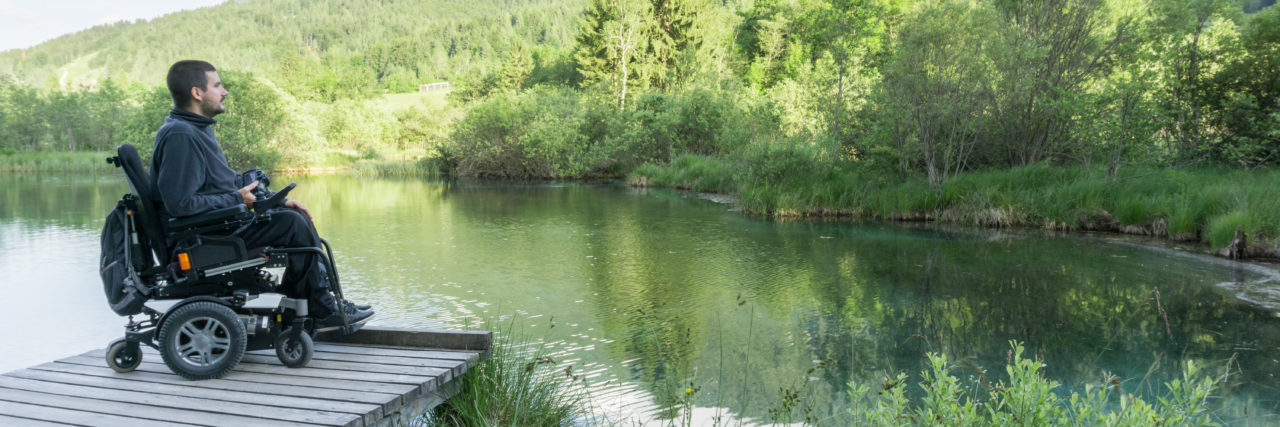For the past 23 years, I have battled a rare neuromuscular disease named Duchenne muscular dystrophy (DMD). It causes my muscles to waste away over time, so I use a power wheelchair and have little physical strength. I am entirely dependent upon those around me to care for all my basic needs like feeding, bathing and using the bathroom. I consult a bevy of doctors to try and maintain my health. I see a cardiologist, pulmonologist, neurologist, endocrinologist, and pretty much any other “-ologist” you can imagine. The medications I take come with a gamut of symptoms, and a Clydesdale would have a difficult time swallowing them.
My circumstances have led to a significant struggle with depression. Dealing with the ignorance of others, the inability to live independently and daily facing your mortality can be trying on a man’s soul. Eventually, my disease will end my life. Living with a debilitating illness has given me a unique view of life. DMD is not the teacher I would have asked for, but I am grateful for the lessons it has taught me.
The first lesson DMD taught me is silence speaks far louder to someone who is struggling than any piece of advice. People in pain usually do not want someone telling them why they are in their current situation or how to get out of it; they want a shoulder to cry on and a hand to hold. They do not want an over-spiritualized and sanctimonious answer thrown in their face as if the issue is so simple. The loving presence or warm touch of another human being is a powerful balm to the deepest of wounds.
In the moment of fiercest suffering, there are no words capable of fixing the problem. Taking the time to sit in loving silence with those in pain shows them you genuinely care and that you are willing to set aside your ego in their moment of greatest need. It shows far greater character when you have the self-control to bridle your tongue. So, next time you feel the need to offer advice to someone in pain, try to remain silent and offer up a warm embrace instead.
The second lesson DMD taught me is the simple things in life bring real joy. When you are incapable of experiencing many simple pleasures, you gain a deep appreciation for those simple pleasures you can experience. It is not a big house or fancy car or a successful career that brings lasting joy; it is the laughter of a small child, the warm sunshine on your face, and the warm embrace of a friend. To experience the pleasures of simplicity, you have to slow down and drink in the moment. Living life at breakneck speed will only lead to regrets in the future. All of us need to take the time to embrace the moment fully, and this is impossible when hiding behind a camera phone. Some moments and simple pleasures are far too sacred to broadcast to the world.
The most crucial lesson DMD taught me is that none of us can live life alone. My very survival is dependent on the care and love of others. Relying on others has led me to the realization that everyone’s survival is in some way dependent upon others. Our existence itself is entirely reliant upon others. I believe we are born not of our wills but through the will of our creator and parents. As children, we rely upon others to feed us, clothe us and shelter us. As we reach adulthood, our mentors give us direction, our lovers provide purpose, and our friends support us. Finally, as we grow old and death draws closer, we again come to rely upon others to feed us, clothe us, and shelter us.
The idea that we must pull ourselves up by our bootstraps is a lie. We need each other to get through this life. It is not strength to claw your way through life alone; it is foolishness. Real strength is allowing yourself to be vulnerable and seeking the help you need. Do not push away the hands outstretched towards you, offering gifts of love and care.
Duchenne has sidetracked many of the dreams I had for my life. The weight of so many dreams deferred can be a heavy burden to bear. I would never choose to have DMD, but I refuse to let it mean nothing. I have learned from it, and I will continue to learn from it. My life will have an impact because of what I have learned from my disability.
Getty image by Grejak.

